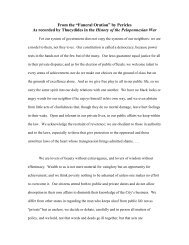Rousseau_contrat-social
You also want an ePaper? Increase the reach of your titles
YUMPU automatically turns print PDFs into web optimized ePapers that Google loves.
the rights which are taken as being part of Sovereignty are really all<br />
subordinate, and always imply supreme wills of which they only sanction<br />
the execution.<br />
It would be impossible to estimate the obscurity this lack of exactness<br />
has thrown over the decisions of writers who have dealt with political<br />
right, when they have used the principles laid down by them to pass<br />
judgment on the respective rights of kings and peoples. Every one can<br />
see, in Chapters III and IV of the First Book of Grotius, how the<br />
learned man and his translator, Barbeyrac, entangle and tie themselves<br />
up in their own sophistries, for fear of saying too little or too much<br />
of what they think, and so offending the interests they have to<br />
conciliate. Grotius, a refugee in France, ill-content with his own<br />
country, and desirous of paying his court to Louis XIII, to whom his<br />
book is dedicated, spares no pains to rob the peoples of all their<br />
rights and invest kings with them by every conceivable artifice. This<br />
would also have been much to the taste of Barbeyrac, who dedicated his<br />
translation to George I of England. But unfortunately the expulsion of<br />
James II, which he called his "abdication," compelled him to use all<br />
reserve, to shuffle and to tergiversate, in order to avoid making<br />
William out a usurper. If these two writers had adopted the true<br />
principles, all difficulties would have been removed, and they would<br />
have been always consistent; but it would have been a sad truth for them<br />
to tell, and would have paid court for them to no one save the people.<br />
Moreover, truth is no road to fortune, and the people dispenses neither<br />
ambassadorships, nor professorships, nor pensions.<br />
3. WHETHER THE GENERAL WILL IS FALLIBLE<br />
IT follows from what has gone before that the general will is always<br />
right and tends to the public advantage; but it does not follow that the<br />
deliberations of the people are always equally correct. Our will is<br />
always for our own good, but we do not always see what that is; the<br />
people is never corrupted, but it is often deceived, and on such<br />
occasions only does it seem to will what is bad.<br />
There is often a great deal of difference between the will of all and<br />
20











